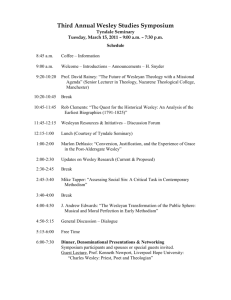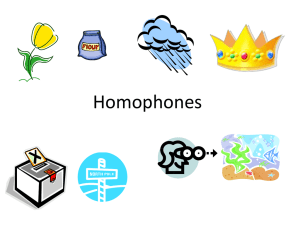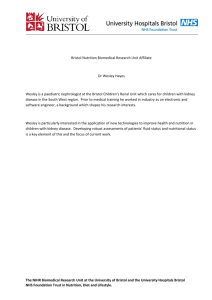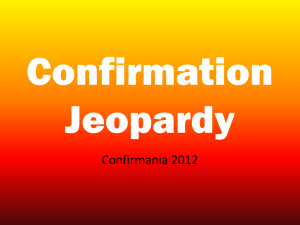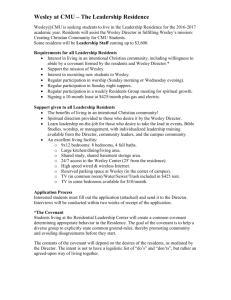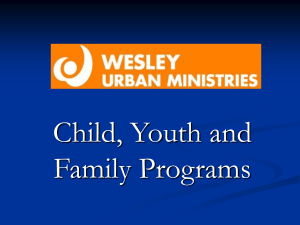Holiness and the Wider Ecumenical Perspective
advertisement
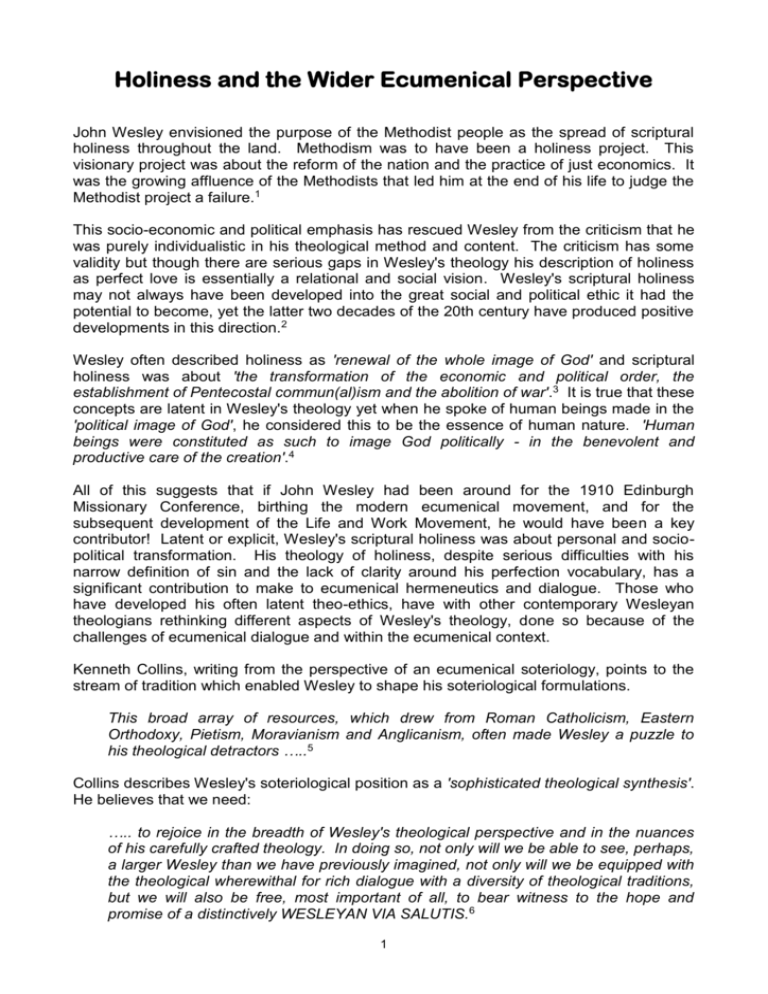
Holiness and the Wider Ecumenical Perspective John Wesley envisioned the purpose of the Methodist people as the spread of scriptural holiness throughout the land. Methodism was to have been a holiness project. This visionary project was about the reform of the nation and the practice of just economics. It was the growing affluence of the Methodists that led him at the end of his life to judge the Methodist project a failure.1 This socio-economic and political emphasis has rescued Wesley from the criticism that he was purely individualistic in his theological method and content. The criticism has some validity but though there are serious gaps in Wesley's theology his description of holiness as perfect love is essentially a relational and social vision. Wesley's scriptural holiness may not always have been developed into the great social and political ethic it had the potential to become, yet the latter two decades of the 20th century have produced positive developments in this direction.2 Wesley often described holiness as 'renewal of the whole image of God' and scriptural holiness was about 'the transformation of the economic and political order, the establishment of Pentecostal commun(al)ism and the abolition of war'.3 It is true that these concepts are latent in Wesley's theology yet when he spoke of human beings made in the 'political image of God', he considered this to be the essence of human nature. 'Human beings were constituted as such to image God politically - in the benevolent and productive care of the creation'.4 All of this suggests that if John Wesley had been around for the 1910 Edinburgh Missionary Conference, birthing the modern ecumenical movement, and for the subsequent development of the Life and Work Movement, he would have been a key contributor! Latent or explicit, Wesley's scriptural holiness was about personal and sociopolitical transformation. His theology of holiness, despite serious difficulties with his narrow definition of sin and the lack of clarity around his perfection vocabulary, has a significant contribution to make to ecumenical hermeneutics and dialogue. Those who have developed his often latent theo-ethics, have with other contemporary Wesleyan theologians rethinking different aspects of Wesley's theology, done so because of the challenges of ecumenical dialogue and within the ecumenical context. Kenneth Collins, writing from the perspective of an ecumenical soteriology, points to the stream of tradition which enabled Wesley to shape his soteriological formulations. This broad array of resources, which drew from Roman Catholicism, Eastern Orthodoxy, Pietism, Moravianism and Anglicanism, often made Wesley a puzzle to his theological detractors …..5 Collins describes Wesley's soteriological position as a 'sophisticated theological synthesis'. He believes that we need: ….. to rejoice in the breadth of Wesley's theological perspective and in the nuances of his carefully crafted theology. In doing so, not only will we be able to see, perhaps, a larger Wesley than we have previously imagined, not only will we be equipped with the theological wherewithal for rich dialogue with a diversity of theological traditions, but we will also be free, most important of all, to bear witness to the hope and promise of a distinctively WESLEYAN VIA SALUTIS.6 1 This larger Wesley is important for ecumenical encounter and dialogue. Theology in the Wesleyan tradition is committed to ecumenism because its theological spirit and substance have been shaped by diverse traditions. Wesley practiced a catholicity which went far beyond the religious zeal that led to bigotry and strife. His sermons on The Catholic Spirit and A Caution Against Bigotry reveal someone who had moved beyond 'opinions' to the 'language of love'. In all of this Wesley combined 'openness and conviction'. Indeed 'Conviction and tolerance can be held together because the source of both is love!' 7 Something of the theological synthesis can be seen in Wesley's approach to the renewal of our true humanity. Thus Wesley places the encounter with divine grace and love in Christ, testified to in the Lutheran doctrine of justification, within the context of the Eastern understanding of the transforming power of the Spirit both within us and through us, making us participants in God's redeeming of all creation. And Wesley would seem to demonstrate that the richness of the Christian gospel cannot be exhausted by any one denominational tradition, but we appropriate this variegated richness as we share in the resources ecumenism makes available to us.8 The Wesleyan understanding of salvation, therefore, owes much to Lutheranism and Eastern Orthodoxy, not to forget the many other streams of tradition. Scriptural holiness is itself an ecumenical theology committing contemporary Methodists to the 'language of love' and the language of dialogue with Christians of all traditions. THE ECUMENICAL DIALOGUE OF TRUTH AND LOVE The Wesleyan spirit and substance should have no difficulty engaging with contemporary ecumenism in its tri-unity of emphases. The tripartite framework of ecumenism is: inter-church inter-faith social ethics. These three are inter-related, indivisible and inter-dependent. The first has to do with faith and order issues. The second engages in dialogue with neighbour religions and the third is often summarised as justice, peace and the integrity of creation. Wesley's vision of holiness as the renewal of the image of God and the transformation of the economic and political order, including the abolition of war, connects with all three inter-related ecumenical dimensions. 1 Inter-Church Ecumenism 'To speak the truth in love' would be a Pauline and a Wesleyan motto for dialogue. Both elements are important: to speak the truth IN LOVE, and to speak THE TRUTH in love. Wesley's sermon on 'Catholic Spirit' not only breathes a generous spirit but also affirms catholic substance.9 2 Methodists are involved in bilateral conversations with Roman Catholics, Lutherans, Reformed and Orthodox. There is also involvement in key multi-lateral dialogues. One of the Wesleyan qualities brought to Methodist participation in ecumenical dialogue is 'a missionary participation'. This 'soteriological interest' for Wainwright has 'the purpose of removing those divisions among Christians that are a countertestimony to the gospel of reconciliation'.10 To the ecumenical dialogue, therefore, Methodists bring their already ecumenically shaped vision of holiness. Soteriology involves missiology and ecclesiology. In the section dealing with The Church as Communion in Love and Truth, the Joint Catholic-Methodist Commission for Dialogue deals with The Church as Mission and follows with a paragraph on The Ecumenical Imperative. It begins: The ultimate aim of mission is to serve God's saving purpose for all of humankind. Just as the Church longs for the oneness of its members in love and prays for it in the liturgy, so it waits in hope for spiritual gifts that will lead it to a higher level of holiness, a more evident fullness of catholicity, and a greater fidelity in apostolicity. This striving after perfection in the God-given marks of the Church implies an ecumenical imperative.11 Holiness is one of the marks of the church and in ecumenical dialogue Methodists will want to emphasise the role of the Spirit as transforming love, renewing the image of God in the communion of love for the sake of the wider socio-political transformation of society. The holiness of the faith community is intimately related to its catholicity and apostolicity, all of which characteristics reach beyond ecclesial life and churchly matters to the life of the world and the totality of the world's relationships. Wainwright lists six principle features of Wesley's vision, programme, and praxis which relate to the classic ecumenical movement. Two of these are Wesley's expectation that sanctification would 'show itself in the moral earnestness and loving deeds of the believers'. The other was his encouragement of 'a social concern that was directed towards the neediest of neighbours'.12 In the wider ecumenical perspective, Methodists will not divorce faith and order issues from social ethics. 2 Inter-Faith Ecumenism The Wesleyan emphasis on holiness as relational, transformative and social connects with the contemporary and unprecedented encounter and dialogue with neighbour religions. The OIKOUMENE has to do with the whole inhabited earth, the whole human community and indeed the entire ecological community. Global perspective, which increasingly is the local standpoint, locates Christianity as a minority religion. For Asian Christians this has always been the perspective and role, a reality they do not see as disadvantageous. For European Christians, minority status may be more difficult to accept. The demise of a Eurocentric, Christendom model of faith creates, for some at least, a crisis of identity. Yet a pluralistic Europe, including neighbour religions and secular humanism is the context for any contemporary Methodist holiness emphasis as well as the setting for inter-faith ecumenism. Contemporary global experience is worlds apart from the time and place of John Wesley. Even though he did claim the world as his parish, his world was very much smaller than the shared planet of the 21st century. Dialogue with neighbour religions 3 was not on the agenda. Is there anything, therefore, in the Wesleyan tradition that would enable contemporary Methodists to engage with inter-faith ecumenism? Though living in a different world Wesley was not unaware of other religions. The challenges of dialogue and pluralism were not on his horizon, yet his theological perspective was remarkably open. Wesley's attitude to other religions was not an outright rejection but a nonjudgemental critical reflection. This was rather unique considering the prevailing attitude of British Christians towards other religions. British Christian attitudes to other religions (pagan and savage tribes) during the seventeenth and eighteenth centuries reflected a strong, confident, aggressive, and often ill-informed type of Christianity.13 It is in Wesley's sermons that his remarkable insights are found. Anti-Semitism was part of the world in which he lived yet he refused to condemn the Jews and was, if anything, more gentle in his attitude towards them than people of other faiths.14 He forbade the damnation of Muslims, praised the sincerity of their response to what he called 'limited revelation' and acknowledged their openness and sensitivity to God's inward voice. I have no authority from the Word of God to judge those that are without. Nor do I conceive that any man living has a right to sentence all the heathen and Mohometan world to damnation. It is far better to leave them that made them, and who is the Father of the spirits of all flesh, who is the God of the heathens as well as the Christians, and also hateth nothing that he has made.15 Wesley's perception of Hinduism is even more remarkable. He adored the search for holiness in Hinduism. Would Wesley have distinguished between the authentic experience of the holy in Hinduism and the authentic experience of the holy in Christianity? The answer may vary. However, Wesley gave equal level of standing between those who experience the holy regardless of their relgion.16 Wesley's attitude to other religions was shaped by his theological standpoint. Something of his 'generous orthodoxy' comes into play here. Wesley did not accept the Reformation dichotomy between nature and grace and he believed in the reality of prevenient grace always and everywhere, in all and for all. The 'light that lightens everyone' had come into the world. The universally available knowledge of God was rooted in God's creation. Holiness of life and the experience of the holy were not confined to Christians. He was prepared to see more justice, mercy and truth in the inhabitants of China or India than in many of the reformed Christians of Europe! 17 Wesley placed more emphasis on faith lived than faith believed. I believe the merciful God regards the lives and tempers of men more than their ideas. I believe He respects the goodness of the heart rather than the clearness of the head.18 4 He was at one with Paul in Romans 2 v 12-16. God would judge on the basis of light received and conscience. 'He that believeth not shall be damned, is spoken to them to whom the gospel is preached'. In the same sermon Wesley again affirmed that God is 'not the God of the Christians only, but the God of the heathen also'.19 Thompson believes that this sermon ' ….. suggests that the exclusive passages in the New Testament were addressed to Christians only and cannot be applied to people of other faiths'.20 On the basis of Wesley's critical reflections on other religions Thompson reaches the following conclusions: he did not reject world religions as unacceptable; he was willing to learn other faiths and appreciate the religiosity of the people of other faiths; he was willing to adopt the best teachings of other faiths; he saw Christianity and other faiths as equal as far as the pursuit of holiness was concerned; he was open to acknowledge the moral integrity of people of other faiths and place them even on a higher ground than Christians; he did not see religions as rivals; he would have approved dialogue between religions as far as moral and religious issues were concerned, and especially the issue of holiness would have been a common agenda.21 There is enough in the Wesleyan tradition to impel contemporary Methodists to engage with inter-faith ecumenism and the religious dialogue at the heart of it. If holiness is a common agenda then the dialogue of spirituality (or Wainwrights's 'spiritual engagement') is a place for contemporary Methodists to positively engage. Wesley's pneumatology may also help as a pneumatalogical starting point for revisioning theology, Christology and missiology. If the Spirit blows where she wills and is at the heart of God's 'undistinguishing regard', then Christians can affirm that the Spirit is active where Christ is not named. 3 Social Ethics Ecumenism The Wesleyan emphases on holiness as the renewal of the image of God and the transformation of society connects with this third area of ecumenism. The interrelatedness of the tripartite approach to ecumenism is also clear given the reality of shared global space and the search for a shared global ethic. Perhaps the major question of the 21st century is 'how can we build a more truly human world?' No one religious tradition can do this alone. If there is no peace for the world without peace between the world's religions, then inter-faith dialogue is an imperative as is a shared peace ethic. 5 From the Christian ecumenical perspective the approach to social ethics is focused on justice, peace and the integrity of creation. These are inter-related and interdependent and embrace the whole human community, economics, politics, militarisation and the environment. Again the Wesleyan emphasis on holiness has a contribution to make to inter-church and inter-faith dialogue. Runyon draws attention to the 'peculiar affinity between Wesley's doctrine of sanctification and movements for social change'.22 Such a vision or goal creates a holy dissatisfaction with the way things are and becomes a future hope that the present can become something better. Such vision is necessary if the process of personal and social transformation is to keep moving. In relation to society, holy dissatisfaction ' ….. provides a persistent motivation for reform in the light of a 'more perfect way' that goes beyond any status quo'. 23 It is this holy dissatisfaction at the heart of Wesleyan holiness that provides a Wesleyan social ethic. Scriptural holiness is a social ethic. Runyon affirms that Wesley; ….. understood God's goal as the transformation of this present age, restoring health and holiness to God's creation. God therefore enters into the life of the world to renew the creature after the divine image and the creation after the divine will.24 Holy dissatisfaction means confronting the injustices of the present age, taking seriously the structural and systemic evils of our time and actively committing to an alternative vision of a healthy and holy world and society. Wesley himself has provided a social ethics agenda, some aspects more developed in his thought and practice then others. Yet the grounding is there for a radical praxis. Runyon has highlighted four key areas which are also key to the ecumenical social ethics agenda; human rights poverty and the rights of the poor the rights of women environmental stewardship. Few will fail to recognise these issues as a 21st century agenda challenging not only Christianity but neighbour religions as well. Missing from Runyon's list but also another key Wesley concern, as it is on an even greater scale for the 21st century, is war and peacemaking. War, violence and conflict have serious implications for human rights, the poor, women and the environment. A more ecological, holistic approach to life in the world will see the interconnectedness of all of these social-ethical issues. Wesley's position on war was complex. John Wesley loved peace and hated war. He urged peaceful ways and attitudes upon his followers, and saw himself as a peacemaker - above all in the American war. Wesley was also an English patriot - one who believed the British government should defend the empire against foreign enemies and 6 internal dissolution, and discharge its international as well as domestic responsibilities with force of arms, if necessary.25 He also believed that 'the end of war should be a return to peace - a peace of reconciliation, not of domination'.26 Wesley's ethic was the just war ethic though without a thorough grounding in moral theology, or at least without evidence from his writings. Wesley appears to have been a peacemaker but not a pacifist. In the 21st century and after the horrific experiences of the 20th century, (which marks out our world as totally different from Wesley's) many ethicists have concluded that the just war ethic is no longer possible. Methodists, as participants in the inclusive ecumenical dialogue, which must also include dialogue with the secular world, are inevitably engaged with the ethical debate on militarisation. The latter includes all forms of warfare and weaponry, nuclear and conventional, the arms trade, responses to terrorists, including state terrorism and the economic and environmental fall-out as well as the abuse of human rights by terrorists and states and the scale of human suffering affecting the poor, women and children especially. Nothing less than a global ethical response is required calling for the ethical resources of all neighbour religions. Furthermore, if conflicts are to be resolved and transformed and the peace of reconciliation rather than domination is to be realised, what role does religion have? Can religion succeed where politics is often failing? Much conflict transformation practice has no place for the spiritual dimension, yet there may just be the beginnings of a realisation that conflict cannot be transformed without religious vision and values. The Wesleyan vision of holiness has its contribution to make to the ecumenical commitment to the renewal of the universe. The strength of that contribution to ecumenical social ethics may well be in the recovery and development of Wesley's own concept of the political image of God. For Wesley, human beings image God in three ways: the natural, moral and political image. The natural image consists of reason, volition and freedom, capacities which humanity possesses. The moral image has to do with the human relationship to God which is continuously received from God. It is gift and consists of love, justice, mercy and truth, which are to be lived in and through relationships within the world. The political image consists of God-given facilities of leadership and management. Much of this Wesley defines in Sermon 60. The human role is to be 'vice-regent upon earth, the prince and governor of this lower world'. The political image was the gift of 'special responsibility of being the channel of conveyance between the Creator and the rest of creation'.27 It is a stewardship role, not just in relation to political governance but as caretaker of creation. Wesley in this same sermon has much to say about the relationship between humans and animals, the latter also being in the natural image of God. Wesley's political language of humanity as vice-regent, prince and governor does need to be changed. His vocabulary has easily translated into domination which historically has been destructive of human and ecological relationships, community and environment. Weber is correct to describe the political image concept as latent in Wesley, even though Wesley considered this to be the essence of human nature. Wesley used the whole image of God concept as 'the focus of his evangelism and its supporting theology'.28 He did not develop the concept nor draw out its radical implications for political life. His neglect of the political image blocked the integration of his politics and his understanding of the way of salvation. It hindered the formulation of a Wesleyan 7 social ethic by focusing on an individualistic concept of Christian love largely incapable of dealing with questions of institution and power. It encouraged controversies over the meaning of Christian perfection and entire sanctification that often were sterile because their moral image concerns had no inherent or integral social and relational dimensions.29 In the 21st century social ethics must address issues of institution and power. A theology and ethics of power and power relations are key, not just to internal, denominational and ecumenical ecclesial life, but to all institutions and structures, cultural, economic and political. The use and abuse of power is the key issue for the present and future of the world. Can scriptural holiness be translated into an ethics of power? The challenge for Wesleyan Christians is to: ….. discern with biblical and theological integrity the meanings of political reality and responsibility; and to confront in the light of these meanings the great and perennial issues of political authority and obligation, the nature and purpose of state and government, the grounds and definitions of rights and liberties, the mandates of justice, and the moral imperatives of peace and war.30 The political image of God implies the political work of God. To be renewed in the political image of God and to engage with integrity the meanings of political reality and responsibility is to participate in the purpose and action of the political God, whose arena is human history and the life of all creation, and whose goal is the renewal of the universe. The political image and holiness are inextricably linked. The political image and the wholeness of salvation belong together. Scriptural holiness is social ethics. The recovery and development of the political image of God draws politics into the order of salvation since 'human politics takes place in the context of God's political care for and ordering of the world, not apart from it'.31 Wesleyan holiness relates to the tripartite ecumenical framework. It has the capacity to contribute to and receive from the wider ecumenical perspective. The tradition is theologically open to dialogue between churches, neighbour religions, secular humanists and all who work for a more just and peaceful world and for more ethically based systems and structures of power. Dr Johnston McMaster June 2002 8 References 1 See the paper Wesley on Social Holiness, Dublin, January 2002 by Johnston McMaster 2 There are at least five notable contributions towards the expression of a Wesleyan social and political ethic. M Douglas Meeks, in God the Economist: The Doctrine of God and Political Economy, (Fortress Press, 1989 Theodore W Jennings in Good News to the Poor: John Wesley's Evangelical Economics, (Abingdon Press, 1990) Manfred Marquardt in John Wesley's Social Ethics, (Abingdon Press, 1992) Theodore Runyn in The New Creation: John Wesley's Theology Today, (Abingdon Press, 1998) Theodore R Weber in Politics in the Order of Salvation: Transforming Wesleyan Political Ethics, (Kingswood Books, 2001) 3 Jennings, op cit, p 153 4 Weber, op cit, p 36 5 Collins, Kenneth J, The Scripture Way of Salvation: The Heart of John Wesley's Theology, (Abingdon Press, 1991) p 205 6 Ibid, p 207 7 Runyon, op cit, p 220 8 Ibid, p 214 9 Wainwright, Geoffrey, Methodists in Dialog, (Kingswood Books, 1995) p 33 10 Ibid, pp 33-34, Wainwright lists three other Wesleyan qualities for ecumenical dialogue. These are: doctrinal responsibility spiritual engagement the glorification of the Triune God 11 Report of the Joint Commission for Dialogue Between the Roman Catholic Church and the World Methodist Council, 1997-2001, Speaking the Truth in Love: Teaching Authority Among Catholics and Methodists, (World Methodist Council, 2000) p 15 12 Wainwright, op cit, pp 283-284. The other four features are: 9 the scriptures as the primary and abiding testimony to the redemptive work of God in Christ Wesley's utter commitment to the ministry of evangelism He valued a generous orthodoxy He found in the Lord's Supper a sacramental sign of fellowship graciously bestowed by the Triune God 13 Helm, Mark S (ed), Grounds for Understanding: Ecumenical Resources for Responses to Religious Pluralism, (Eerdmans, 1998) p 98. The chapter The Search for a Methodist Theology of Religious Pluralism is by Nehemiah Thompson of the General Commission on Christian Unity and Inter-Religious Concerns of the United Methodist Church 14 Wesley, Sermon 106 15 Wesley, Sermon 130 16 Thompson in Helm, op cit, p 99 17 Wesley, Sermon 61 18 Wesley, Sermon 130 19 Wesley, Sermon 91 20 Thompson in Helm, op cit, p 101 21 Ibid, p 100 22 Runyon, op cit, p 168 23 Ibid, p 168 24 Ibid, p 169 25 Weber, op cit, p 353 26 Ibid, p 353 27 Wesley, Sermon 60 28 Weber, op cit, p 36 29 Ibid, pp 36-37 30 Ibid, p 37 31 Ibid, p 417 10
